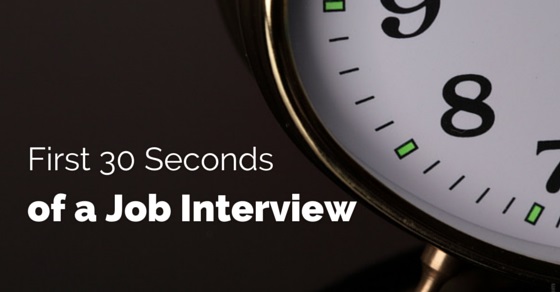A job interview is very critical because you make an impression on the recruiter and that decides whether you get a job or not.
You need to make the best impression in the first 30 seconds of a job interview. In these 30 seconds, even the most trivial things can make a deep impact on the interviewer and your future will completely depend on the impression you have created.
So be careful and prepared while you venture to appear for an interview.
These tips may help you stay alert and prepared and understand what happens during the first 30 seconds.
 First 30 Seconds of a Job Interview:
First 30 Seconds of a Job Interview:
1. Body Language:
Body language has a great impact on the impression created by an individual on a recruiter.
The recruiter tries to gauge whether the candidate is tensed, worried or conscious within the first 5 seconds of seeing him.
Your body language clearly reveals your emotions to the onlooker. You must avoid gestures like biting your fingernails, pulling your hair, scratching the desk, realigning the dress, looking downwards and wiping your cheeks frequently.
These are all clear indicators of stress, fear and anxiety. These usually hold against you in a job interview. You need to take an effort to curb such body language and be confident and positive.
2. Basic Manners:
Basic manners count a lot when you apply for a job. Recruiters are as human as any of us and they get easily annoyed by poor manners and lack of hygiene.
Many people do not realize how their poor manners can impact their routine life in a really bad way.
Individuals who are in the habit of scratching their head or digging for gold should strictly avoid these practices while appearing for an interview. These are habits that instantly distract an employer and at times even annoy them greatly.
3. Posture:
 If you are still wondering how the posture of an individual can hamper the image he creates, think twice. Someone with drooping shoulders is sure to give the impression of a person who has lost all hope in life.
If you are still wondering how the posture of an individual can hamper the image he creates, think twice. Someone with drooping shoulders is sure to give the impression of a person who has lost all hope in life.
Some people have drooping shoulders from birth and cannot really do much about it but there are others who develop the habit of drooping their shoulders.
Such individuals should be extra careful trying to avoid the habit. This could actually reflect his lack of confidence. It may reflect through other gestures too.
4. Grooming:
A well groomed individual is always a visual treat but even other individuals need to take care of some basic grooming aspects. This includes having a tidy haircut, using a good deodorant and maintaining a fresh breath.
It is annoying to speak to individuals whose breath smells sour. The basic precautions need to be taken by each individual.
Imagine speaking the first word and watching the disgust on your recruiter’s face. Make sure you comb your hair neatly and look fresh while appearing for an interview.
5. Discipline:
Discipline counts not just in your job but also during your job interview. Companies always seek individuals who abide by the basic rules of the firm and they ascertain this by evaluating how disciplined you are during the interview.
Make sure you reach the interview on time. Do not take the seat till you are told to sit down. The basic level of respect you show during an interview reveals how disciplined you are.
Greet the person interviewing you with a crisp handshake. This is not just good discipline but also a mark of your confidence.
Do not interrupt when the interviewer is speaking to you. Meet the person eye to eye while speaking to him.
6. Dressing:
 Candidates often assume that interviewers only observe the dressing of the female candidates as they have multiple options. This is not really true. The dressing and attire of each candidate matters a lot.
Candidates often assume that interviewers only observe the dressing of the female candidates as they have multiple options. This is not really true. The dressing and attire of each candidate matters a lot.
A male candidate should not just make sure that he wears proper formal attire but should also make sure that the attire is worn properly.
7. Accessories:
Among the first things that an interviewer notices in you, one factor would surely be the accessories you carry with you. People who are professional are expected to carry a pen in the pocket.
Candidates wearing watches may be assumed punctual or time conscious. Candidates who surf a lot may carry a pen drive or a data card.
These things indirectly reveal how good you are in your profession. Make sure you carry the vital accessories when you plan to attend a job interview.
8. Communication:
In the first 30seconds of an interview, it is difficult to gauge whether the person has a good communication skill.
Yet, it is possible to make out if a person is too talkative or too shy. Both these natures are not suitable in professional career.
Individuals are expected to limit their conversation to the extent that is suitable in such environment. Talkative individuals will never be trusted when it comes to professional secrets.
Shy individuals, on the contrary, will never get to play leadership roles in organizations. You must know the art of communication in professional environment if you wish to succeed.
Getting a job is really the first stage of the game plan while retaining the job matters lot more. These simple etiquettes and mannerisms may not seem too important to you but they really cause many people to lose their respectable jobs in big organizations.







































